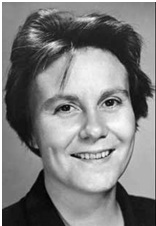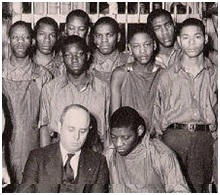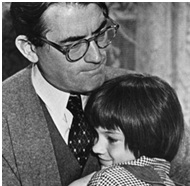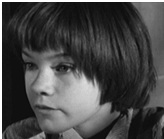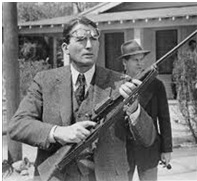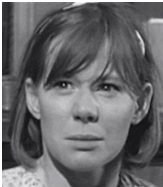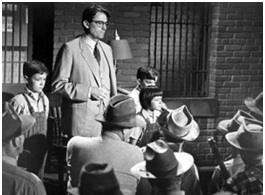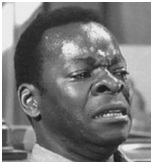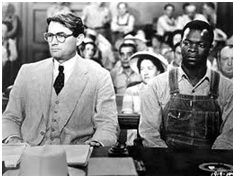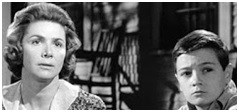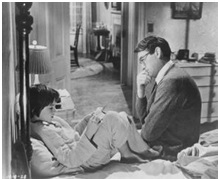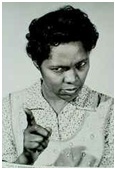|
 |
|
 |
To Kill a Mockingbird - Racism and Ethics
To Kill a Mockingbird (1960)
Written by the American female author, Harper Lee (1926- ), pictured right.
Set in... 1930's Maycomb, Alabama (based on Harper Lee's home town of Monroeville). The girl character, Scout, was based on Harper Lee, and Atticus Finch based on her father.
Who inspired the book? The Scottsboro Boys (pictured right). They were African American youths wrongly convicted of raping two white girls in 1931.
Fun facts
Key characters Scout (nickname of Jean-Louise Finch), young white girl and the book’s narrator. Atticus (Finch), her father and a white lawyer. Jem, her older brother. Dill Capote, Scout and Jem's friend. Calpurnia (Cal), the Finch family’s African American cook. Boo Radley, the Finchs’ neighbour. Tom (Robinson), African American accused of rape. The story It is the summer of 1933 and Scout (pictured right in the film) is near her sixth birthday in Maycomb, Alabama. She, her brother, Jem and their friend, Dill, are fascinated by their reclusive neighbour, Boo Radley, who:
The children try to entice Boo out of his house. Unfortunately, the house of their friendly neighbour, Miss Maudie, burns down, and Boo puts a blanket around her shoulders. Scout and Jem learn to respect their father, Atticus Finch (a widowed lawyer), particularly after he shoots a mad dog in the street (pictured right in the film). He gives them an air rifle each for Christmas and tells them it’s a sin to kill a mockingbird, because it's so beautiful and does nobody any harm. He also teaches his children to be empathetic and hate cruelty and unfairness. Jem starts to learn this lesson,
when he realizes how courageous another neighbour, Mrs. Dubose, has been in her fight against
morphine addiction, when he reads to her just before her death. Atticus is attacked by the white community for defending an African American, Tom Robinson, after he is charged with raping a poor white girl, Mayella Ewell (pictured right in the film). This teaches Scout and Jem about racial prejudice, practised by many whites including their Aunt Alexandra, who comes to live with them. They are disgusted by such racism because of
Before the trial, Atticus sits outside Maycomb jail, guarding Tom from a lynch mob (pictured right). This is dispersed by its leader, Mr Cunningham, after Scout makes him feel guilty through a friendly enquiry about his son and her classmate, Walter. In court, Atticus shows that the alleged victim, Mayella, was hit by a strong left hand but Tom’s left hand is crippled. It is clear that her left handed father, Bob Ewell, beat her up, not Tom Her loneliness encouraged her to grab Tom and try and kiss him, leading to the trumped up rape charge. Despite Tom’s innocence, the white jury find him guilty. Jem and Scout are shocked and astonished. A desperate Tom (pictured right below in the film) is killed trying to escape from prison. Atticus
interrupts Aunt Alexandra’s charity tea party and asks Calpurnia to accompany him to tell Tom’s wife,
Helen, of his death. Bob Ewell attacks Jem and Scout with a knife as revenge against Atticus. Jem is injured and heroically rescued by Boo Radley. Ewell is found stabbed to death with his knife. Atticus soon realizes that Boo was the killer and is persuaded by Heck Tate, the town sheriff, to keep the incident quiet to protect Boo. Scout visits Boo, sees the world from his point of view and realizes what a great man he is.
Lessons for racism and ethics
1. Understand people Atticus teaches Scout the importance of:
Scout thinks that Boo Radley (Robert Duvall, pictured right, in the film) is a mad recluse until he rescues her and Jem. She also grieves for Tom and his family.
2. Racism is wrong Tom’s only crime is that he is black. He is a good, church going guy with a loving wife and three children. In Maycomb there are bad racist bigots like Bob Ewell as well as good non-racists like:
3. Courage is cool Atticus has enormous moral courage defending Tom and standing up to Maycomb’s racists like Bob Ewell. He tells his children that real courage is “when you know you're licked before you begin but you begin anyway and see it through no matter what” This is just like Mrs Dubose’s brave fight against morphine addiction. Atticus (Gregory Peck) is pictured above with Tom (Brock Peters) at the trial in the film.
4. Be optimistic Despite the racist evil in Maycomb, there is hope for the future through good people like
Miss Maudie (Rosemary Murphy, pictured right, with Jem, Philip Alford, in the film):
It also seems certain that Jem and Scout will carry on Atticus’s fight for justice. One person in the jury is also doubtful about Tom’s guilt, giving hope that racism might not last forever. 5. Integrity inspires Atticus (pictured right in the film) is a leader of his community because of his:
6. Humility and honesty are important Atticus is never arrogant or condescending But Calpurnia wisely advises the children that you can sometimes annoy less knowledgeable people (like the racists). As with everybody else, Atticus is honest and never devious with his children. He:
So they respect each other and the children become more mature and responsible. 7. Never stop learning Scout and Jem learn lots of lessons about love and justice, particularly from:
8. Religion doesn’t necessarily make you right There are plenty of racist church goers in Maycomb like Aunt Alexandra. But there are also good Christians like:
Some church goers quote a Bible verse to criticize Miss Maudie's garden, and she responds with another verse that totally contradicts them!
Key quote on emotional intelligence You never really understand a person until you consider things from his point of view - until you climb into his skin and walk around in it, Atticus
Key quotes on ethics The one thing that doesn’t abide by majority rule is a person’s conscience, Atticus. The only obligation which I have a right to assume is to do at any time what I think is right, Atticus. Remember it’s a sin to kill a mockingbird. (the mockingbird symbolizes innocence), Atticus.
Key quotes on the law The one place a man ought to get a square deal is in a courtroom, be he any colour of the rainbow,
Atticus
Key quotes on relationships I think there’s just one kind of folks. Folks, Scout Folks don’t like to have somebody around knowin’ more than they do. It aggravates ‘em, Calpurnia
Key quotes on leadership Atticus Finch is the same in his house as he is on the public streets, Miss Maudie. I simply wanted to tell you that there are some men in this world who were born to do our unpleasant jobs for us. Your father’s one of them, Miss Maudie.
Two literature websites to recommend 1. sparknotes.com 2. litcharts.com
|
|
|
||
|
|
|
||
|
||
| Copyright © wisdomtowin.com All Rights Reserved | ||
|

